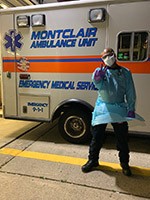Evan Jenkins '19 BA, EMT, SN

Student, Second Degree Accelerated BSN Track (BSNExpress) Fitzpatrick College of Nursing
EMT, Montclair (NJ) Ambulance Unit
June 13, 2020
Evan Jenkins holds a BA degree in Humanities and Psychology from Villanova University and anticipates graduating with his BSN degree in July 2020. He is studying to challenge the paramedic exam and wants to become a mobile intensive care nurse (MICN) after graduation so is studying for that exam too. In late July, he is slated to launch his nursing career at the University of Maryland Medical Center as a Cardiac Surgical ICU nurse.
Her lips were the color of a four-thirty A.M. sky. She, poorly propped up by half plumped pillows, laying amidst an aery of lines, chaotic wires, and clogged drainage tubes, seemed to be drowning on dry land. Yet, somehow, we were dispatched for hypoglycemia (low blood sugar). It is not uncommon in EMS to be sent to a residence for one problem and discover an issue that is more pressing, or completely different from what was stated – it’s half the allure of the work actually, the mystery of it all. My partner and I crossed the room in an instant - armed with N95s, gowns, goggles, and a darn good pair of purple gloves - and got to work. After taking steps to support her respiratory efforts and assessing her vitals we, along with the advanced life support (ALS) crew found that she was indeed hypoglycemic… and hypotensive, bradycardic and tachypneic, and overall dangerously close to arresting at any minute. COVID-19 hit without warning or apology. On the front lines it seems near daily that the virus challenges us to jump over new hurtles and find balance on unfamiliar ground. It presents an obstacle in which healthcare workers have to grow into a new skin, find a way to make the N95 and gown fit into the well-worn routines. It is in the accumulation of this extra weight that, now more than ever, healthcare workers acutely understand their inalienable obligations to the service of humanity.
Against the better advice of professors much wiser than me, I have been working full time as an EMT for Montclair (NJ) Ambulance Unit while in the BSNExpress program. Over the years, I have had the opportunity to experience and learn quite a bit, specifically in the areas of critical care and emergency medicine. I have been working in or around healthcare for eight years, and I have been an EMT for a little over six years. From surgically removing ticks with tweezers and managing blisters on dirt roads along the Appalachian Trail in high school, to coding gunshot victims, and medically managing septic patients in the back of an ambulance, I have had unique opportunities which have forced me to grow as a provider and nursing student. My time on the ambulance has allowed me to transform nursing theories into clinical practice outside of my academic curriculum, which I hope will be invaluable in my transition to clinical practice.
I got into nursing after a personal encounter with a healthcare team. I was inspired by the heart of the Villanova nurses and nurse practitioners that took care of me when I needed it most. Initially, it was they who that taught me that nursing demands personhood – authenticity in its fullest. Those who enter nursing are born to do this work – drawn to it as if pulled by gravity. In every sense I think that people who enter healthcare become: a doctor, a pharmacist, a physician's assistant or a nurse. We all kind of stumble into the profession eyes open, unbalanced, and appropriately terrified until one day the scrubs fit, and the stethoscope feels like our own.
Despite our well-founded concerns for our personal safety, and the safety of our loved ones, I am proud to say that my crew acted where others might have taken pause. An endotracheal tube was placed, her sugar levels were corrected, and blood pressure was managed with IO (intraosseous) fluids. We delivered to the closest Emergency Department, critical but stable.
Although my working environment isn’t always favorable, I wouldn’t trade it for the world. EMS in a similar way to nursing exposes you to a litany of colorful people, each with their own hue of humanity. It is my distinct honor and pleasure to serve the residents of the Township of Montclair during this global pandemic. Furthermore, I am nothing but grateful to Villanova Nursing for the lessons, support, and values that they have instilled in me as a provider. It has truly made all the difference.
